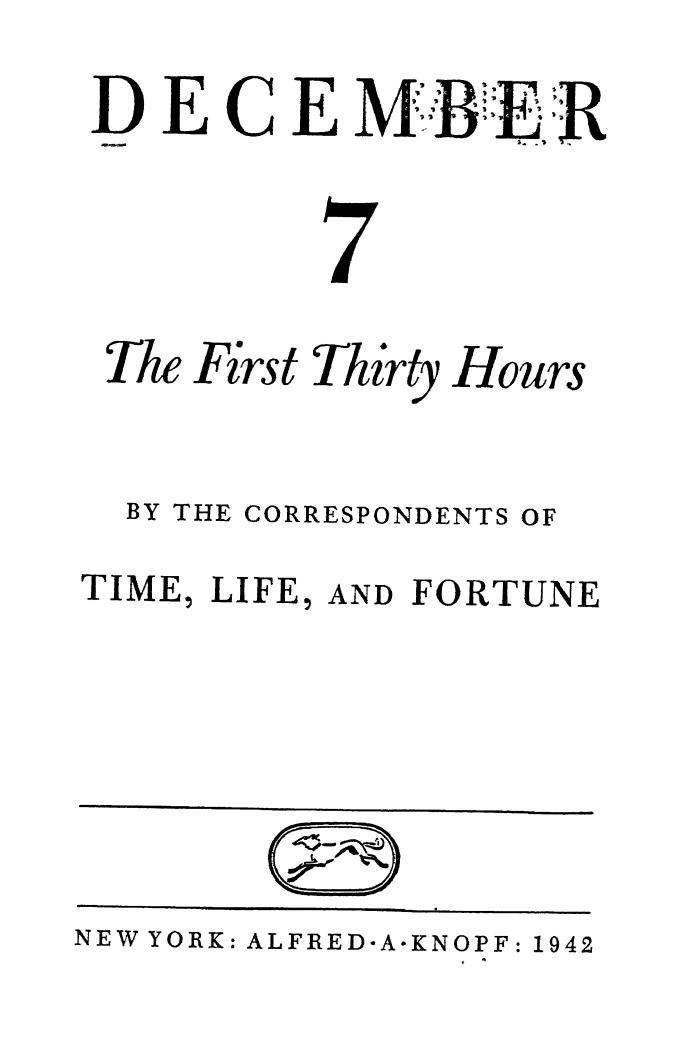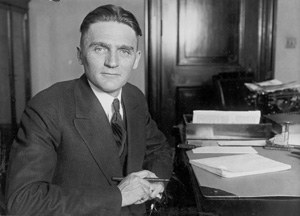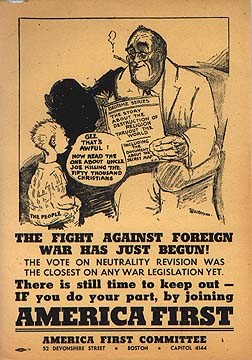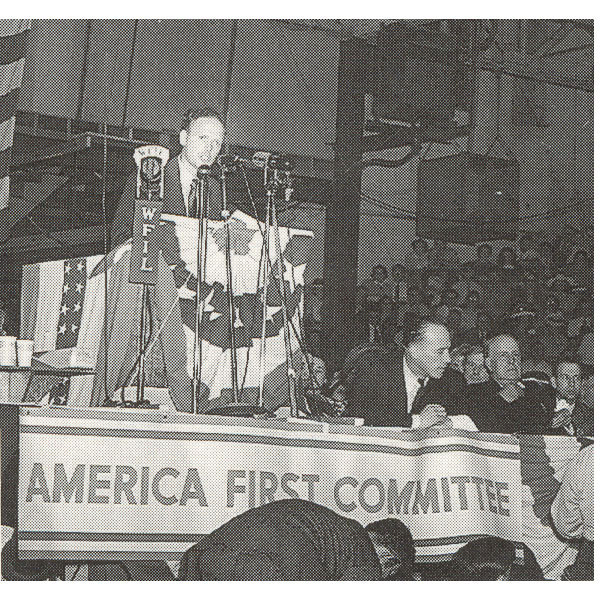
PITTSBURGH, PA.: wire from Robert Hagy. December
7: The First Thirty Hours,
by the correspondents of Time, Life, and Fortune.

The strangest development here involved
America Firsters assembled in Soldiers' and Sailors'
Memorial Hall in Oakland Civic Center, three miles from downtown Pittsburgh.
Senator Gerald P. Nye, tall, dark, handsome North Dakotan, spoke to 2500
rank-and-filers (capacity) from hall-wide platform
above which Lincoln's Gettysburg Address is spread in huge dark letters against
a dirty buff background.
I was assigned to cover it for the Post Gazette, and
just a few minutes before leaving the office, flashes
and bulletins came over the AP wire on the Hawaii
and Manila attacks.
 Gerald Nye
Gerald Nye
I arrived at the hall at 3:00 p.m., the time the meeting was scheduled to start, and found Nye in a two-by-four room backstage ready to go on with the local officials of the Firsters. I shoved the pasted-up news at him. Irene Castle McLaughlin, still trim wife of the dancer killed in World War I, another speaker, and Pittsburgh Chairman John B. Gordon, clustered around the Senator to read. It was the first they had heard of the war and Nye's first reaction was: "It sounds terribly fishy to me. Can't we have some details? Is it sabotage or is it open attack? I'm amazed that the President should announce an attack without giving details." Cool as a cucumber, he went on to compare the announcement with the first news of the Greer incident [in September, a US destroyer carrying mail to Marines stationed in Iceland had had two torpedoes shot at it by a German submarine, both of which missed. It chased the sub for several hours and dropped 19 depth charges before losing contact. FDR called this "an act of piracy" and said that US vessels would no longer wait to be fired on before engaging with Axis ships or planes. America Firsters viewed this as an attempt to stampede the US into the war], which he termed very misleading.
I asked him what effect the Jap war should have on America First, whether it
would disband. He replied: "If Congress were to declare war, I'm sure that
every America Firster would be cooperative and support his government in the
winning of that war in
every possible way . . . but I should not expect them to disband even if Congress
declared war." Nye and the others then paraded onto the platform as if
nothing had happened.
 |
 Charles Lindbergh speaks to an America First rally |
Although the news had come over the radio, apparently nobody in the audience knew anything, and the meeting went on just like any other America First meeting with emphasis on denouncing Roosevelt as a warmonger. Mrs. McLaughlin expressed concern for America's wives and mothers, her voice catching as she referred to Vernon Castle's not coming back; dabbed a tear from her eye as she sat down.
The next speaker was ruddy, ruralish Charlie Sipes,
Pennsylvania State Senator, locally famed as a historian. Routine America First
stuff until, in the midst
of an attack on Roosevelt for trying "to make everything Russian appealing
to the U. S.," he cried: "In
fact, the chief warmonger in the U. S,, to my way of
thinking, is the President of the U. S.!" While the hall,
decked in red-white-and-blue balcony bunting and "Defend America First" signs,
was still full of roaring approval, a white-haired, heavy-set man stood up
from
an aisle seat well to the rear. The man, although nobody knew him and he was
in mufti, was Colonel
Enrique Urrutia Jr., Chief of the Second Military Area
(Pittsburgh District of Third Corps Area) of the Organized Reserve. "Can
this meeting be called after
what has happened in the last few hours?" Colonel
Urrutia--an infantryman 31 years in the Army--burst out, livid with incredulity
and indignation. "Do you
know that Japan has attacked Manila, that Japan has
attacked Hawaii?"
Apparently the crowd took him for a plain crackpot
heckler. They booed, yelled "Throw him out" and "Warmonger." Several
men near Urrutia converged toward him. According to Lieutenant George Pischke,
in command of a detail of ten policemen assigned to
keep down disturbances which usually mark America
First meetings here, the committee's blue-badged
ushers "tried to manhandle" the colonel. Cops were
in quick though, and Lieutenant Pischke escorted
Urrutia out of the hall (through a blizzard of "warmonger" shrieks
and reaching women's hands) at the
latter's own request. "I came to listen," he told me in
the lobby, purple with rage. "I thought this was a patriots' meeting,
but this is a traitors' meeting." Inside,
Siapes, a cool hand, tried to restore calm, said soothingly, "Don't be
too hard on this poor bombastic man.
He's only a mouthpiece for F.D.R." Then Sipes went
on with his speech.
A couple of other people addressed the crowd.
Finally came Nye. Still no word from leaders about
the war. Nye started at about 4:45 p.m. For nearly
three quarters of an hour he went through his isolationist routine. "Whose
war is this?" he demanded at
one point (referring to war in Europe) . "Roosevelt's,"chorused the
rank-and-filers. "My friends," said Nye callously, "are betting
20 to 1 that if we don't stop in
our tracks now, we'll be in before Great Britain gets
in." Howls of laughter. A few minutes after this, I
was called to the telephone. The city desk had a bulletin on Japan's declaration
of war and asked me to
get it to Nye. On a piece of copy paper I printed in
pencil: "The Japanese Imperial Government at Tokyo
today at 4:00 p.m. announced a state of war with the
U. S. and Great Britain." I walked out on the platform
and put it on the rostrum before Nye. He glanced at
it, read it, never batted an eye, went on with his
speech.
For 15 minutes more, Nye continued his routine."I
woke up one morning to find that we had 50 ships less,
that the President had given them away despite laws
forbidding it." "Treason," yelled some. "Impeach
him," yelled others. Finally, at 5:45 p.m., more than
two and a half hours after the meeting started, Nye
paused and said: "I have before me the worst news
that I have encountered in the last 20 years. I don't
know exactly how to report it to you; but I will report it
to you just as a newspaperman gave it to me." Slowly
he read the note. An excited murmur swept through
the packed hall. Nye continued: "I can't somehow
believe this. I can't come to any conclusions until I know what this is all
about. I want time to find out what's behind it. Previously I heard about bombings
in Hawaii. Somehow, I couldn't quite believe that, but in the light of this
later news, I must, although there's been many funny things before. I remember
the morning of the attack on the destroyer Greer. The President went on |he
radio and said the attack on the Greer was without provocation; but I tell you
the Greer shot first. That was the incident the President said was unprovoked
and that's cheating."
With that, he disposed of the new war, but more or less upset and flushed in the face, he didn't do much more than flounder through five or six more minutes of stuff about America's prime duty being to preserve democracy lest "victor and vanquished alike fall" and communism "grow in the ruins." Loud applause. " Keep your chins up," said Senator Nye and sat down. Benediction, a couple of announcements and the meeting was over.
Plowing through his fanatical followers, I gave Nye a third piece of intelligence that Roosevelt had called a 9:00 p.m. meeting of the Cabinet and Congressional leaders. I knew he was scheduled to talk tonight at the First Baptist Church (pastor of which is pacifist) and I asked him if he intended to fly to Washington. Flustered, grim-lipped, rosy-faced, sweating, he muttered, "I must, I must try . . ." and strode quickly out of the hall talking to somebody about plane reservations....Whether he couldn't get a plane or what, he nevertheless ended up keeping the church appointment, announcing he would take the train to Washington later tonight. At church, before 600 people, he was grim, bitter, defeated. "I had hoped for long that at least the involvement of my country in this terrible foreign slaughter would be left more largely to our own determination."
Then he reviewed events leading up to the war, accusing Roosevelt of "doing his utmost to promote trouble with Japan," Inferring that we were already at war with Germany, he declared: "I am not one to say my country is prepared to fight a war on one front, let alone two." When several people laughed at a reference (out of habit?) to "bloody Joe Stalin," Nye said coldly: "I am not making a humorous speech." But on the Jap attack he said: "Here is a challenge. There isn't much America can do but move forward with American lives, American blood and American wealth to the protection of our people and possessions in the Pacific."
Leaving the church, another Post-Gazette reporter caught him, asked what course he would prescribe for the nation. Finally he gave in completely, the fight gone out of him except for enough to make one more crack at Roosevelt. "We have been maneuvered into this by the President," he said, "but the only thing now is to declare war and to jump into it with everything we have and bring it to a victorious conclusion."